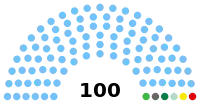Senate (Cameroon)
The Senate is the upper house of the Parliament of Cameroon.
Senate Sénat | |
|---|---|
 | |
| Type | |
| Type | Upper House of the Parliament of Cameroon |
| History | |
| Founded | 2013 |
| Leadership | |
President | |
| Structure | |
| Seats | 100 members |
 | |
Length of term | 5 years |
| Elections | |
| Indirect election | |
Next election | 12 March 2023 |
| Meeting place | |
| Yaoundé | |
 |
|---|
|
|
History
The Senate was created in 1996 after an amendment to the constitution created the upper chamber.[1] However, power to convene the Electoral College and call elections for the Senate remained with the President. President Paul Biya chose not to do so until he signed decree 2013/056 on 27 February 2013, which set 14 April as the election date.[1]
Electoral system
The Senate has 100 seats, of which 70 are elected and 30 appointed by the President, with each region having 10 Senators.[1] The elected seats are elected by the 10,636 members of the 360 municipal councils.[1]
Elections to the Senate were held for the first time on 14 April 2013.[1] Marcel Niat Njifenji was elected as President of the Senate on 12 June 2013. The President of the Senate is the constitutionally designated successor to the President of the Republic in case of a vacancy in the latter office.[2]
Presidents of the Senate
| Name | Entered office | Left office | Notes |
|---|---|---|---|
| Marcel Niat Njifenji | 12 June 2013 | Incumbent | [3] |
Current members of the Senate
The Senate consists of 70 members directly elected by their regions and 30 nominated by the president of Cameroon. [4][5]
| Region | Elected members | Appointed members |
|---|---|---|
| Adamawa | Aboubakar Siroma Maikano Abdoulahi Haman Paul Maande Paul Nguiebe Joël Haoua Madeleine Ahmadou Tidjiani |
Baba Hamadou Moussa Sabo Mohaman Gabdo |
| Centre | Naah Ondoa Sylvestre Mama Jean Marie Anong Adibimé Pascal Bell Luc René Nicole Okala Essomba Tsoungui Elie Nnemdé Emmanuel |
Nkodo Laurent Ondoua Pius Pongmoni Jean Marie |
| East | Salé Charles Tokpanou Isabelle Ouli Ndongo Monique Ndanga Ndinga Badel Amama Amama Benjamin Moampea Marie Calire Mboundjo Jean |
Matta Joseph Roland Zé Nguelé René Aboui Marlyse |
| Far North | Abba Boukar Alioum Alhadji Hamadou Julienne Djakaou Mahamat Abdoulkarim Mme Zakiatou Abdoulaye Wouyack Marava Amrakaye Martin |
Mahamat Bahar Marouf Baskouda Jean Baptiste Dakolé Daïssala |
| Littoral | Geneviève Tjoues Tobbo Eyoum Thomas Din Bell Armande Mbassa Ndine Roger Victor Kingué Simon Ebongue Jean Jules Kemayou Claude |
Madiba Songue Etame Massoma Siegfried Ngayap Pierre Flambeau |
| North | Youssoufa Daoua Namio Pierre Mme Asta Yvonne Ahmadou Alim Amidou Maurice Mme Adamou Bebnone Payounni |
Aboubakary Abdoulaye Hayatou Aicha Pierrette Hamadou Abbo |
| Northwest | Achidi Achu Simon Wallang David Akwo Dinga Ignatius Mme Enoh Lafon Wanlo John Awanga Zacharie Jikong Stephen Yerima |
Fon Doh Gayonga III Nkwain Francis Fon Teiche Nje II |
| South | Medjo Delphine Zang Oyono Obam Assam Mba Mba Grégoire Eloumba Medjo Thérèse Nnanga Ndoume Mbita Mvaebeme Raymond |
Ngalli Ngoa Pierre Henri Menye Ondo François Xavier Bisseck Paulette |
| Southwest | Tabe Tando Ndiep Nso Ankie Affiong Rebecca Amah Njifua Lucas Fontem Matute Daniel Mme Ntube Agnès Ndode Otte Andrew Moffa Mbella Moki Charles |
Mafany Musonge Peter Fun Mukete Essimi Ngo Victor Chief Anja Simon Onjwo |
| West | Tsomelou Jean Tantse Tagne Bernard Tatchouang Paul Metiedje Nguifo Tchetagne Delphine Sonkin Etienne Tchomnou Raoul M. Nono |
Sultan Ibrahim Mbombo Njoya Honoré Djomo Kamga Marcel Niat Njifenji |
References
- Focus On: Cameroon’s First Senate Race Archived 2013-04-26 at the Wayback Machine IFES
- "Cameron : Marcel Niat Njifenji élu Président du Sénat", Xinhua, 13 June 2013 (in French).
- "Cameroon". 5 July 2018.
- "CAMEROUN: Le Sénat au complet! - La liste des 100 (70 élus et 30 nommés)".
- "Liste des Sénateurs du Cameroun".